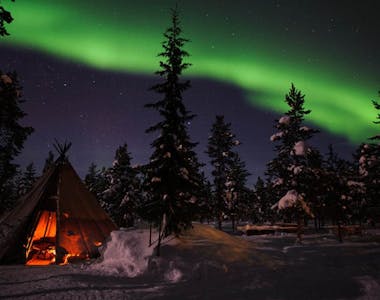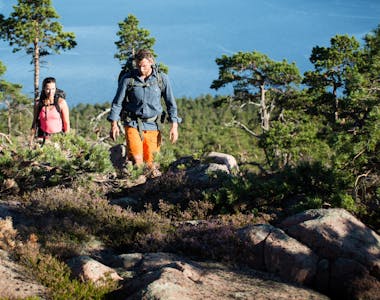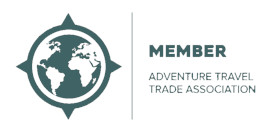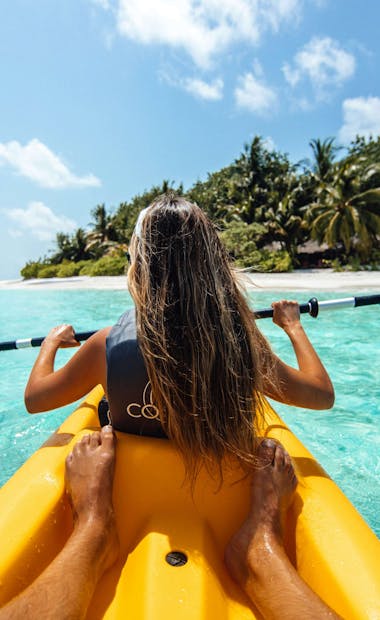
Sweden Getaways
Enjoy crystal clear lakes, pine tree forests, hills and beaches
Popular tours
- Save7%
 View Tour
View TourSwedish Lapland, Arctic Bath & Northern Lights - Private - 5 Days
- Luleå to Luleå
- Age group: 15 - 99
- Max group size: 7
Was:£3,200From£2,965 - Save7%
 View Tour
View TourMagic of the Fjords & Stockholm - 9 Days
- Bergen to Stockholm
- Age group: 15 - 99
- Max group size: 45
Was:£2,470From£2,288 - Save7%
 View Tour
View TourStockholm to Helsinki Cruise & Tallinn - 5 Days
- Stockholm to Stockholm
- Age group: 15 - 99
- Max group size: 16
Was:£935From£866 - Save7%
 View Tour
View TourCopenhagen, Oslo & Stockholm - 10 Days
- Copenhagen to Copenhagen
- Age group: 15 - 99
- Max group size: 16
Was:£2,815From£2,608 - Save7%
 View Tour
View TourCopenhagen to Stockholm by Train - 5 Days
- Copenhagen to Stockholm
- Age group: 15 - 99
- Max group size: 16
Was:£1,305From£1,209 - Save7%
 View Tour
View TourMagic of the Fjords Stockholm to Stavanger - 11 Days
- Stockholm to Stavanger
- Age group: 0 - 99
- Max group size: 30
Was:£3,185From£2,951
Sweden Tours
Welcome to the enchanting land of Sweden, where ancient history meets contemporary charm. If you're seeking a memorable travel experience, Sweden offers a wealth of opportunities to immerse yourself in its breathtaking landscapes, vibrant cities, and rich cultural heritage. Embark on unforgettable Sweden tours and holidays that will leave you captivated by the country's diverse attractions.
Venture into the heart of Stockholm, the captivating capital city, where medieval architecture coexists harmoniously with modern Scandinavian design. Explore the cobblestone streets of Gamla Stan, the charming old town, and marvel at the royal splendor of the Royal Palace. Discover world-class museums, such as the ABBA Museum, the Vasa Museum, and the Moderna Museet, showcasing captivating exhibits that span centuries of Swedish history and art.
For nature enthusiasts, Sweden's pristine landscapes beckon. Lose yourself in the stunning beauty of the Stockholm Archipelago, an archipelago of over 30,000 islands and islets, where you can sail, kayak, or simply relax in the tranquility of nature. Head north to Lapland, where the mystical Northern Lights dance across the sky, and experience the thrill of dog sledding or snowmobiling in a winter wonderland.
No visit to Sweden is complete without exploring its picturesque countryside. Journey to the stunning Swedish Lapland and witness the breathtaking landscapes of Abisko National Park or the awe-inspiring Icehotel in Jukkasjärvi. Be mesmerized by the charm of the countryside with its red wooden cottages, rolling green meadows, and sparkling lakes.
For history buffs, a visit to the ancient city of Uppsala is a must. Immerse yourself in the rich Viking history, explore the medieval Uppsala Cathedral, and wander through the renowned Uppsala University, the oldest university in Sweden.
Sweden's culinary scene is an adventure in itself. Indulge in traditional Swedish dishes such as köttbullar (meatballs), gravlax (cured salmon), and smörgåsbord (a variety of open-faced sandwiches). Pair your meal with a refreshing glass of Swedish aquavit or explore the craft beer culture that has been flourishing in recent years.
Sweden also boasts a commitment to sustainability, innovation, and a high quality of life. Experience the world-famous Swedish concept of "lagom" - the art of balanced living, where simplicity, harmony, and sustainability are valued.
Whether you seek urban sophistication, natural wonders, cultural treasures, or a combination of them all, Sweden offers a tapestry of experiences that will leave you with memories to last a lifetime. Join us on our Sweden tours and holidays, and discover the beauty, charm, and captivating allure of this extraordinary Scandinavian gem.
When to Travel?
The best time to visit Sweden largely depends on your preferences and the activities you wish to engage in. Sweden experiences distinct seasons, each offering its own unique charm. Here's a breakdown of the seasons and their characteristics:
Summer (June to August): This is the most popular time to visit Sweden, especially for outdoor activities and exploring the country's stunning landscapes. The weather is generally mild to warm, with long daylight hours, particularly in the northern regions. It's a great time for hiking, camping, boating, and enjoying the vibrant festivals and events.
Spring (April to May) and Autumn (September to October): These transitional seasons offer pleasant weather with milder temperatures. Spring brings blossoming flowers and trees, while autumn paints the landscapes with vibrant colours as the leaves change. It's a good time for sightseeing, city exploration, and enjoying outdoor activities before or after the peak tourist season.
Winter (December to February): Winter in Sweden can be quite cold, especially in the northern parts, but it also offers unique experiences. If you enjoy winter sports like skiing, snowboarding, or ice skating, this is the ideal time to visit. Additionally, witnessing the magical Northern Lights (Aurora Borealis) is a popular attraction in the northern regions during winter.
It's important to note that the climate can vary across different regions of Sweden, with the north being colder and experiencing more extreme conditions compared to the south. Before planning your trip, consider the specific activities you'd like to engage in and the weather conditions that suit your preferences.
Will I need a visa to travel to Sweden?
Whether you need a visa to travel to Sweden depends on your nationality and the purpose and duration of your visit. Sweden is a member of the European Union (EU) and the Schengen Area, which allows for visa-free travel for citizens of certain countries for short stays. Here are some general guidelines:
Schengen Visa: If you are a citizen of a country that is not exempt from the visa requirement, you will need to apply for a Schengen Visa. This visa allows you to travel to and within the Schengen Area, which includes Sweden, for up to 90 days within a 180-day period. The Schengen Visa application should be submitted to the Swedish embassy or consulate in your home country or the designated visa application centre.
Visa Exemption: Citizens of certain countries, including the United States, Canada, Australia, and most EU member states, do not require a visa for short stays in Sweden or the Schengen Area. However, the purpose of your visit must be for tourism, business, or other approved reasons, and the duration of your stay must not exceed 90 days within a 180-day period.
It's essential to check the specific visa requirements and regulations that apply to your country of citizenship. The Swedish embassy or consulate in your home country will provide the most accurate and up-to-date information regarding visa applications and requirements.
What are the must see destinations in Sweden?
Sweden offers a range of captivating destinations that cater to various interests. Here are some must-see destinations in Sweden:
Stockholm: The capital city of Sweden, Stockholm, is a vibrant and beautiful city spread across numerous islands. Visit the historic Gamla Stan (Old Town), explore the royal palace, enjoy world-class museums like the Vasa Museum and ABBA Museum, and take a boat tour through the archipelago.
Gothenburg: Located on the west coast, Gothenburg is known for its charming canals, picturesque neighborhoods, and thriving food scene. Don't miss attractions such as Liseberg amusement park, Universeum science center, and the Gothenburg Botanical Garden.
Malmö: Situated in southern Sweden, Malmö offers a blend of modern architecture and historical sites. Explore the iconic Turning Torso skyscraper, wander through the quaint streets of the Old Town (Gamla Väster), and visit the impressive Malmö Castle.
Kiruna: Located in Swedish Lapland, Kiruna is known for its stunning natural beauty and the opportunity to witness the Northern Lights. Visit the Icehotel, go dog sledding, and experience the Sami culture.
Gotland: An island in the Baltic Sea, Gotland boasts medieval architecture, picturesque landscapes, and beautiful beaches. Explore the medieval town of Visby, a UNESCO World Heritage site, and relax on the island's sandy shores.
Uppsala: Home to one of Scandinavia's oldest universities, Uppsala offers a rich history and charming atmosphere. Visit Uppsala Cathedral, explore the historical Gustavianum museum, and wander through the botanical gardens.
Swedish Lapland: For a unique Arctic experience, venture into Swedish Lapland. Explore the Abisko National Park, go skiing in the resorts of Åre and Riksgränsen, and participate in activities like ice fishing and reindeer sledding.
Visiting the Archipelago: Sweden's archipelagos, including the Stockholm Archipelago and the Gothenburg Archipelago, offer breathtaking natural beauty and serene island getaways. Take a boat trip, go kayaking, or simply enjoy the peaceful surroundings.
These are just a few highlights, and Sweden has much more to offer depending on your interests and preferences. Whether you're interested in city life, natural beauty, cultural heritage, or outdoor adventures, Sweden has something to captivate every traveler.
What is the local currency in Sweden, and can I use credit cards?
The local currency in Sweden is the Swedish Krona (SEK). It is advisable to have some cash in SEK for smaller establishments that may not accept credit cards or for situations where cash is preferred.
Credit cards are widely accepted in Sweden, especially in larger cities and tourist areas. Visa and Mastercard are the most commonly accepted cards, followed by American Express. It's a good idea to carry a credit card for convenience and larger purchases. Contactless payments using cards or mobile payment apps are also popular and widely accepted in Sweden.
However, it's always a good idea to carry some cash for emergencies or situations where cards may not be accepted, such as smaller businesses or rural areas. ATMs are easily found in Sweden, allowing you to withdraw cash in SEK using your debit or credit card.
When using your credit card in Sweden, be aware that some banks may charge foreign transaction fees or currency conversion fees. It's advisable to check with your bank or credit card provider to understand any fees or charges that may apply while using your card in Sweden.
Is Sweden a good family holiday destination?
Yes, Sweden can be an excellent destination for a family holiday. The country offers a wide range of family-friendly activities, attractions, and natural wonders that cater to all age groups. Here are some reasons why Sweden is a great family holiday destination:
Safety: Sweden is known for being a safe and family-friendly country, with a high standard of living and well-developed infrastructure. You can feel secure traveling with your family and exploring various parts of the country.
Outdoor Adventures: Sweden's vast natural landscapes provide ample opportunities for outdoor adventures suitable for families. From hiking and cycling to skiing and canoeing, there are plenty of activities to enjoy together. Sweden's many national parks, forests, and lakes offer opportunities for exploration and bonding with nature.
Theme Parks and Attractions: Sweden boasts several theme parks and family-oriented attractions that are sure to entertain children and adults alike. Liseberg in Gothenburg is one of Scandinavia's largest amusement parks, offering a variety of rides and entertainment. Gröna Lund in Stockholm is another popular amusement park with thrilling attractions. Other attractions like Skansen open-air museum and Junibacken, dedicated to Astrid Lindgren's beloved characters, offer educational and fun experiences for families.
Wildlife Encounters: Sweden is home to diverse wildlife, and there are opportunities to observe and interact with animals. Children can enjoy visiting wildlife parks and zoos, such as Kolmården Wildlife Park or Orsa Rovdjurspark, where they can see bears, wolves, moose, and other animals up close.
Cultural and Historical Experiences: Sweden has a rich history and cultural heritage that can be explored through museums, castles, and historical sites. Kids can learn about Viking history, visit royal palaces, and engage in interactive exhibits in various museums across the country.
Family-Friendly Accommodation: Sweden offers a range of family-friendly accommodation options, including hotels, holiday parks, and vacation rentals. Many accommodations provide amenities such as playgrounds, swimming pools, and activities designed for children.
Education and Sustainability: Sweden's focus on education and sustainability provides a unique opportunity for children to learn about environmental conservation, renewable energy, and sustainable living practices.
With its safe environment, abundance of outdoor activities, and diverse attractions, Sweden offers a memorable and enjoyable family holiday experience.
Is Sweden a good destination for solo travellers?
Yes, Sweden can be a fantastic destination for solo travellers. Here are some reasons why Sweden is a good choice for solo exploration:
Safety: Sweden is considered one of the safest countries in the world, making it an ideal destination for solo travellers. The crime rates are relatively low, and you can feel secure while exploring cities, towns, and natural areas on your own.
English Proficiency: Swedes are known for their high level of English proficiency, particularly among the younger generation. Most people, especially in urban areas and tourist destinations, can communicate in English, which makes it easier for solo travellers to navigate and seek assistance if needed.
Well-Developed Infrastructure: Sweden has excellent infrastructure, including efficient public transportation systems, well-maintained roads, and a reliable network of trains, buses, and ferries. This makes it convenient for solo travellers to navigate and explore the country independently.
Solo-Friendly Culture: Swedish culture places value on individualism and independence, which creates an environment where solo travellers are generally respected and welcomed. You'll find that locals are often helpful and respectful towards solo travellers, making it easier to connect with people and have meaningful experiences.
Outdoor Adventures: Sweden's stunning natural landscapes provide ample opportunities for solo travellers to engage in outdoor activities. Whether it's hiking in national parks, kayaking in pristine lakes, or exploring the vast wilderness of Swedish Lapland, there are countless adventures to embark on solo.
Cultural Experiences: Sweden offers a rich cultural scene, from its modern cities to traditional festivals and events. Solo travellers can immerse themselves in Swedish art, design, music, and cuisine, and visit museums, galleries, and historic sites at their own pace.
Solo-Friendly Accommodation: Sweden provides various accommodation options suitable for solo travellers, including hostels, budget hotels, and guesthouses. These establishments often offer communal spaces where you can meet fellow travellers and share experiences.
Scandinavian Lifestyle: Exploring Sweden allows you to experience the renowned Scandinavian lifestyle, characterised by a focus on nature, wellness, and work-life balance. Solo travellers can embrace the tranquility, solitude, and self-reflection that come with this lifestyle.
Sweden's safety, English proficiency, well-developed infrastructure, and solo-friendly culture make it a great destination for solo travellers seeking independence, adventure, and cultural experiences.
Is Sweden a safe destination?
Yes, Sweden is generally considered a safe destination for travellers. It has a reputation for being one of the safest countries in the world. However, as with any travel destination, it's always advisable to take necessary precautions and be aware of your surroundings. Here are a few points to keep in mind:
Low Crime Rates: Sweden has relatively low crime rates, particularly when it comes to violent crimes. Pickpocketing and petty theft can occur in crowded tourist areas or on public transportation, so it's essential to stay vigilant and take precautions to protect your belongings.
Safe Cities: Swedish cities, including Stockholm, Gothenburg, and Malmö, are generally safe for travellers. Violent crimes are rare, and you can feel secure walking around during the day and evening. However, it's always recommended to use common sense, especially in unfamiliar areas or late at night.
Nature Precautions: If you plan to explore Sweden's natural landscapes, such as national parks or hiking trails, it's essential to be prepared and follow safety guidelines. Familiarise yourself with the terrain, weather conditions, and any specific safety recommendations for the area you're visiting.
Road Safety: Sweden has well-maintained roads and a high level of road safety. If you plan to drive, make sure to adhere to traffic regulations, use seat belts, and follow speed limits.
Emergency Services: Sweden has a reliable emergency response system. The emergency number to call for police, ambulance, or fire services is 112.
As always, it's advisable to have travel insurance that covers medical emergencies, trip cancellations, and personal belongings. Stay informed about any travel advisories or guidelines issued by your home country's government and exercise caution to ensure a safe and enjoyable visit to Sweden.
Will I require any vaccinations to travel to Sweden?
As of my knowledge cutoff in September 2021, there are no specific vaccinations required for travellers visiting Sweden. The country does not have any mandatory vaccine requirements for entry.
However, it's always a good idea to stay up to date with routine vaccinations recommended by your home country's healthcare system. These may include vaccines such as measles-mumps-rubella (MMR), diphtheria-tetanus-pertussis, varicella (chickenpox), and influenza. Additionally, it is advisable to consult with a healthcare professional or travel medicine specialist well in advance of your trip to Sweden to discuss any specific health concerns or recommendations based on your individual health status and travel itinerary.
It's worth noting that the situation regarding vaccinations and travel requirements can change over time, so it's essential to check the latest information from official sources such as the World Health Organisation (WHO) or the Centers for Disease Control and Prevention (CDC) closer to your travel date or consult with a healthcare professional.
How does the rooming work on tours?
Small group tours in Sweden typically involve a set itinerary where you travel with a group of fellow travellers and a tour leader/guide. Accommodation arrangements vary depending on the specific tour you choose. Here are some common aspects of rooming arrangements on small group tours:
Shared Rooms: In order to promote camaraderie and facilitate interaction among group members, most tours arrange shared accommodation. This means you will be paired with another member of the same gender from the group to share a room. Roommates may sometimes change periodically throughout the tour.
Single Supplement: If you prefer to have your own room and privacy, you may have the option to pay a single supplement fee. This additional fee allows you to have your own room for the duration of the tour. However, please note that single supplements can vary in cost and availability.
Roommate Matching: Tour operators usually offer roommate matching services, where they try to pair you with a suitable roommate based on your preferences, such as age range. This can help ensure compatibility and a more enjoyable experience for all participants.
Rooming Preferences: When booking your small group tour, it's important to communicate your rooming preferences to the tour operator. If you have specific requirements or preferences, such as sharing with a friend or a specific roommate request, it's advisable to inform the tour operator during the booking process.
It's important to carefully read the tour details and inclusions provided by the tour operator to understand their specific rooming policies. If having your own room is a priority, make sure to inquire about the availability of single supplements and any associated costs before booking your tour.
Keep in mind that while sharing a room with a fellow traveller can be a great way to meet new people and build connections, having your own room provides more privacy and flexibility. Consider your preferences and the dynamics of the tour when deciding whether to opt for a shared room or pay for a single supplement.
Remember to communicate your needs and preferences clearly with the tour operator during the booking process to ensure a comfortable and enjoyable accommodation experience on your small group tour in Sweden.
What is the food like in Sweden?
Swedish cuisine reflects the country's unique cultural and geographical influences. Here are some key aspects of Swedish food:
Local Ingredients: Sweden's culinary traditions often highlight locally sourced ingredients, including fish, berries, mushrooms, game meats (such as reindeer and elk), and dairy products. The country's vast forests and pristine waters contribute to the availability of fresh and high-quality ingredients.
Seafood: Given Sweden's long coastline, seafood plays a significant role in Swedish cuisine. Popular seafood dishes include gravlax (cured salmon), herring prepared in various ways, smoked fish, and seafood soups.
Smorgasbord: Smorgasbord is a traditional Swedish buffet-style meal that features a wide array of cold and hot dishes. It often includes pickled herring, cured meats, cheese, salads, bread, and other accompaniments. It's a festive and social dining experience.
Meatballs: Swedish meatballs, known as köttbullar, are a classic dish enjoyed both at home and in restaurants. These small, seasoned meatballs are typically made from a mixture of ground beef and pork, and they are often served with lingonberry sauce, creamy gravy, and potatoes.
Potatoes and Bread: Potatoes and bread are staples in Swedish cuisine. Potatoes are commonly served as a side dish, while bread, particularly rye bread, is a popular accompaniment to meals. Open-faced sandwiches, known as smörgås, are also common, featuring various toppings on bread.
Fika: Fika is an essential part of Swedish culture. It refers to a coffee break accompanied by pastries or cakes. Swedes take fika seriously, and it provides an opportunity to socialize and relax during the day.
Sweet Treats: Sweden has a love for sweets and desserts. Traditional Swedish desserts include cinnamon buns (kanelbullar), princess cake (prinsesstårta), semla (a cardamom-spiced bun filled with almond paste and whipped cream), and various fruit pies and tarts.
New Nordic Cuisine: Sweden has also embraced the principles of the New Nordic Cuisine movement, which emphasizes seasonal, local, and sustainable ingredients. This has led to innovative and contemporary interpretations of traditional Swedish dishes in many restaurants.
Overall, Swedish cuisine offers a blend of traditional dishes and modern interpretations, often showcasing fresh, locally sourced ingredients. It's worth exploring both classic Swedish fare and the exciting culinary scene in cities like Stockholm and Gothenburg to get a taste of the diverse flavors Sweden has to offer.
Can I drink the tap water in Sweden?
Yes, tap water in Sweden is generally safe to drink. The country has high-quality tap water that undergoes rigorous testing and treatment to ensure its safety. The water supply is well-regulated and meets the high standards set by the Swedish authorities.
In fact, Sweden has some of the cleanest and best-tasting tap water in the world. It is common for Swedes to drink tap water both at home and in public places without any concerns.
When traveling in Sweden, you can confidently drink tap water from faucets in hotels, restaurants, and other establishments. It's a convenient and cost-effective way to stay hydrated during your trip.
However, if you have any specific concerns or are traveling to a more remote area, it's always a good idea to check with the local authorities or your accommodation to ensure the tap water is safe to drink. They can provide you with the most up-to-date information regarding water quality in the specific region you are visiting.
Are there any cultural norms in Sweden I should follow?
Yes, like any country, Sweden has its own set of cultural norms and customs that visitors should be aware of. Here are some key cultural norms in Sweden:
Personal Space and Privacy: Swedes value their personal space and privacy. It's important to respect people's boundaries and avoid unnecessary physical contact or intrusion into personal space, especially with strangers. Maintain an appropriate distance when engaging in conversations or queuing in public spaces.
Punctuality: Swedes value punctuality and appreciate others being on time for appointments, meetings, and social gatherings. It is considered respectful to arrive at the agreed-upon time or inform others in advance if you will be delayed.
Equality and Gender Equality: Sweden places great importance on gender equality, and Swedes strive for equal treatment and opportunities for all individuals. It's important to demonstrate respect and equality in your interactions with people of all genders.
Queueing and Waiting in Line: Swedes value fairness and respect when it comes to waiting in lines. It is customary to queue patiently and wait for your turn in various settings, such as at shops, public transportation, or ticket counters.
Moderate Volume: Swedes generally speak softly and maintain a moderate volume in public spaces, such as restaurants, cafes, and public transport. Speaking loudly or causing disruptions may be considered impolite.
Removing Shoes: It is common in Sweden to remove your shoes when entering someone's home. This practice helps to keep indoor spaces clean and is considered respectful.
Sustainability and Recycling: Swedes have a strong commitment to environmental sustainability and recycling. It's appreciated if you follow the local recycling guidelines and use recycling bins appropriately.
Cashless Payments: Sweden is known for being a cashless society, and electronic payments, including credit/debit cards and mobile payment apps, are widely accepted. Carrying cash is less common, so it's advisable to have alternative payment methods available.
Tipping: Tipping is not as prevalent in Sweden as it is in some other countries. Service charges are often included in bills, but it's still common to leave a small tip for good service or round up the bill.
While Swedes are generally friendly and tolerant, it's important to be respectful and considerate of local customs and norms. By observing and adapting to these cultural practices, you can have a more enjoyable and respectful experience during your visit to Sweden.
What should I pack for a trip to Sweden?
When packing for a trip to Sweden, it's important to consider the season, weather conditions, and activities you plan to engage in. Here's a general packing list that can be customized based on your specific travel plans:
Clothing:
- Layered clothing: Sweden's weather can be changeable, so pack a variety of lightweight and medium-weight clothing that can be layered to accommodate varying temperatures.
- Sweaters or fleeces: These are essential for keeping warm, especially during cooler months.
- Waterproof jacket or raincoat: Sweden can experience rain throughout the year, so a waterproof jacket or raincoat is useful to stay dry.
- Comfortable walking shoes: Ensure you have comfortable shoes suitable for walking and exploring both urban areas and natural landscapes.
- Hat, gloves, and scarf: These are particularly important for winter visits or colder regions of Sweden.
- Swimwear: If you plan to visit during the summer months or visit coastal areas with beaches, pack swimwear.
Travel Essentials:
- Travel adapter: Sweden uses Type C and Type F electrical outlets with a standard voltage of 230V. Make sure to bring a compatible travel adapter for your electronics.
- Portable charger: Keep your electronic devices charged while on the go.
- Travel documents: Pack your passport, travel insurance documents, and any necessary visas or identification cards.
- Medications: If you take any prescription medications, ensure you have an adequate supply for the duration of your trip, along with any necessary prescriptions or documentation.
- Travel guidebook or maps: Having a guidebook or maps of the areas you plan to visit can be helpful for navigation and exploring.
Other Items:
- Travel-size toiletries: Bring travel-sized toiletries or decant your preferred products into smaller containers.
- Sunscreen and sunglasses: Even during colder months, protecting your skin and eyes from the sun is important.
- Travel towel: A lightweight and quick-drying travel towel can come in handy, especially if you plan to visit beaches or stay in accommodations where towels may not be provided.
- Daypack or backpack: A small daypack or backpack is useful for carrying essentials during day trips or outdoor activities.
- Snacks: It's always a good idea to have some snacks on hand, especially if you're traveling to more remote areas or have dietary restrictions.
Remember to check the weather forecast for your specific travel dates and locations in Sweden to ensure that you pack accordingly. Layering clothing will allow you to adjust to temperature changes throughout the day. Also, consider the activities you have planned and pack any specialised gear or equipment needed for those activities.
Finally, pack light and avoid overpacking, as it will make it easier to move around and navigate during your trip.


Book With Confidence
Monthly Payments
Spread the costs with no interest or additional fees
Best Price Guarantee
We won't be beaten on price. If you find this adventure at a lower price please get in touch!
Reserve now & pay later
Reserve your adventure today and pay later, free of charge
ATOL protected
Book with confidence
Hold your space today, for free
or book your trip with a deposit and then pay the rest in instalments.
Reserve your flights with us
Add flights to your booking and we'll take care of the rest. You'll get 24/7 support from our team & ATOL protection.
Speak to our experts
Call or email our expert team to find out more and help with ideas and planning.








